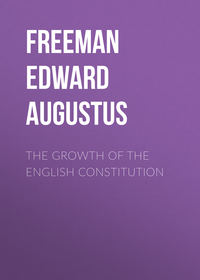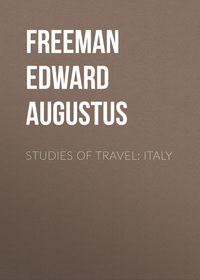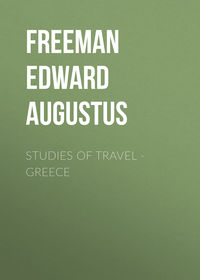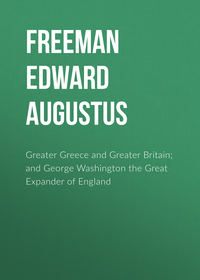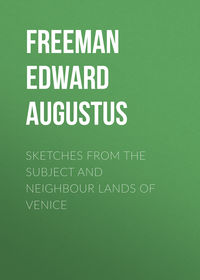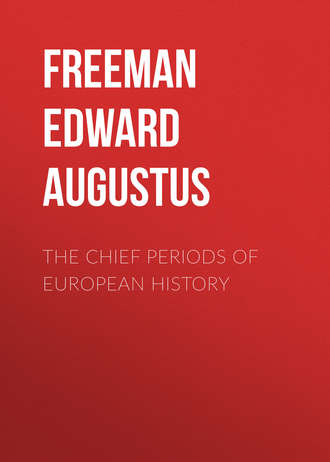 полная версия
полная версияThe Chief Periods of European History
As long as any shadow of Roman power lasted, the theory that there lived on at Rome a central judgement-seat for the world was never wholly forgotten. As East and West became, not only separate but hostile, as the Western Pontiff stepped for many purposes into the place of the Western Emperor, it was the ecclesiastical rather than the Imperial Rome to which the nations sought as their common judge. Still in either case it was Rome that spoke; the world at least of Western Europe still acknowledged a centre by the Tiber, though that centre might have shifted from the Regia and the Septizonium to the Lateran and the Vatican. The world of which the Lateran and the Vatican were centres was presently cut short by a spiritual revolt. And that spiritual revolt was largely measured by national distinctions. As Eastern Europe, Greek and Slavonic Europe, had never admitted the spiritual dominion of the Western Rome, so now Teutonic Europe cast that dominion aside. Nations which had, in the teeth of Emperors, asserted their independence in the affairs of the world, now asserted their independence no less in the range of man’s spiritual being. The Church of Rome remained, like the Empire of Rome, a power mighty and venerable, but a power confined, if not within the bounds of a single nation, at least within the bounds of a group of nations closely connected in history and speech. As there was a Holy Roman Empire of the German Nation, so there was now a Holy Roman Church of the Latin-speaking folk. In one important point indeed we may say that the range of the new Roman power was narrowed yet further. There was a time when the bishopric of Rome, with all that the bishopric of Rome carried with it, was, in practice as well as in theory, open to men of all nations that admitted the spiritual power of Rome. Now, though no law forbids the election of a Pope of any nation, in practice the choice of the electors has long been confined to men of Italian birth. This privilege indeed might be looked on as in some sort a survival or revival of local Roman supremacy; more truly it is a falling back on days before the spiritual supremacy of Rome began. It is a falling back on times when the Roman church, still a local church though the first of local churches, naturally sought for its chiefs among its own members. But so far as it is a falling back in either sense, it is a falling back in a shape better fitted for later times; here again the nation takes the place of the city; Italy takes the place of Rome. In short the Roman Church, still in theory coextensive with the world, once really coextensive with Western Europe, has shrunk up into a body mainly Latin with a head exclusively Italian. It is indeed only in a broad and general sense that we can take such propositions as that the Latin nations clave to Rome while the Teutonic nations fell away. That there are many exceptions needs no proof. It is plain that the Roman Church can still boast herself of not a few Teutonic and Slavonic subjects. It is no less plain that there are here and there, though in smaller numbers, men of Latin speech, both in East and West, who are not her subjects. Still the general proposition is none the less true in its general sense. It marks, to say the least, general tendencies which run a certain course wherever there is no special cause to hinder them. If we look narrowly into each case of exception, we shall often see some special cause, commonly some political cause, which accounts for the anomaly. We may note further that, as the Empire became more purely German and the Papacy became more purely Latin, the old feuds between Empire and Papacy died out. The Austrian Emperors, Catholic chiefs of an Empire mainly Protestant, had no such warfare to wage with the Roman see as had been waged by the Franconians and the Swabians. But as Empire and Papacy alike came to be thus shut up within narrowed and definite limits, neither could any longer act as a common centre, even for the Western lands. For better or for worse, the world has fallen back on an older state of things. Instead of a single Rome as the acknowledged head of all, instead of two rival Romes, each claiming the headship of its own half of the civilized world, it is now open to every nation, as in the earlier day it was open to every city, to do, as far as it finds to do it, that which is right in its own eyes. Every nation now, as every city then, may play the part of Rome for the years or for the moments through which it may keep enough of physical strength to play that part.
The latest times then are in truth a return to the earliest times, with this difference, that nations have taken the place of cities. Two of the masters of history in later times have pointed out the close analogy between the mutual relations of the cities of old Greece and those of the nations of modern Europe. The lesson has been taught us in its fulness alike by Arnold and by Grote. It hardly fell within the scope of either master to point out how truly the likeness is a cycle, how the later state of things is a return to the earlier, after the existence for many ages of a state of things wholly unlike either. They were hardly called on to dwell upon the causes which have brought about this return to an earlier state of things, or on the causes which made that return, as every return to an earlier state of things must be, a return only partial, a return largely modified by the events which have taken place in the meanwhile. It was enough for them to point the analogy. And the analogy is answer enough to those shallowest of the shallow who go about winning cheers from half-taught audiences by declaiming on the uselessness of studying the institutions of “petty states” and by asking what can be gained by knowing about battles fought two thousand years ago. The substitution of the nation for the city is, from one side, part of the process which we may, for our purposes, call the physical growth of the world. The world in which we live is in physical extent vastly bigger than the first civilized world of old Greece, vastly bigger than the far wider Mediterranean world of Rome. What the Ægæan and its borderlands once were, what the Mediterranean and its borderlands once were, Ocean and his borderlands, his borderlands spread over so many continents and islands, are now. No one ought to be more ready than students of political history to welcome every modern scientific invention. The discoveries which have gone so far to annihilate distance ought to call up our deepest thankfulness. But we are perhaps thankful for them on other grounds than those for which they are prized by their own inventors; we are certainly thankful for them on other grounds from those for which they are prized by those who go about bragging about the worthlessness even of the knowledge of times when those inventions were unknown. The steamer, the railway, the telegraph, are wholesome and necessary institutions; they are wholesome and necessary in order to hinder man’s intellectual and political life from being crushed by mere physical extension. They allow the England of our day to come nearer to the Athens of Periklês than the England of a hundred years back, of fifty years back. They allow the United States of America, spread over a world wider than any age of Roman empire, to abide as a Confederation free and united, the true fellow of the old Achaia shut up within the bounds of Peloponnêsos. They are needful in an age when nations have taken the place of cities, that they may make the nations really the political equals of the cities. You may again, some of you, chance to hear some smatterer sneering at petty states ignorant of the great discoveries of natural science. Tell him that the highest use of the discoveries of natural science has been to raise large states to the political level of small ones.
The causes which have led to the substitution of nations for cities in the modern world are many, many more than I can attempt to deal with in this lecture; but not a few of them are nearly connected with the main subject of this course, the condition of Europe in its three great stages, before Rome, under Rome, and after Rome. I long ago defined modern history, if the formula has any meaning at all, to mean the history of the times in which the Teutonic and Slavonic nations have held the foremost place. Now among both these races the tendency to look to the city as the natural centre of social and political life has always been far less developed than it was among the southern nations. We may say southern nations in general; for if the highest developement of the city belongs to Greece, yet it is also very strong in Italy – let Rome and Capua bear witness; and if the growth of the city life was much less perfect among Gauls and Iberians than it was among Greeks and Italians, yet Gauls and Iberians had certainly made a nearer approach to it than Slaves or Teutons. The causes of this difference, the detailed shapes in which this difference shows itself, if I ever speak of them at all, I must speak of some other time, and after all they perhaps rather belong to the province of the Reader in Anthropology than to mine. For the present purpose we may simply accept the fact. Take the highest type of each class. Greek political society starts from the city; separate cities may be grouped into confederations. Teutonic political society starts from the tribe; separate tribes may be fused into nations. I use the word group in one case, the word fuse in the other, because in the Teutonic case the union has both happened far more universally and has been far more perfect than in the Greek case. We must take one more glance at the old free Hellas, before the growth of Rome, before the growth of Macedonia. Its ideal is the perfectly independent city; it is only the experience of a later age which leads cities to join into confederations. The process is in some sort an unwilling one; we may be sure that Sikyôn and Corinth would never have given up one jot of their perfect separate independence through any smaller motive than the need of union among cities that had to escape or to throw off Macedonian domination. The Teutonic political unit, the tribe, or whatever we call the body of settlers who occupy a shire or gá, holds another position. Neighbouring and kindred tribes join into a nation – at first most likely they join into some group greater than the tribe and less than the nation – with far greater ease than Greek cities join into confederations. Some of the reasons are obvious. A city has in the nature of things a more distinct and abiding political being than a mere district, a mere space on the map. Two shires may be physically rolled into one, and the rolling into one does not carry with it any necessary political subjection of one part of the new whole to the other. Two cities can seldom be physically rolled into one; the political union of two cities is necessarily more imperfect than that of two districts, and it is hard to unite them at all without giving some degree of superiority to one over the other. Again, the tendency of a tribe, whether wandering or settled in its district, is to the headship of a personal chief, whether hereditary or elective; if the assembly is the body of the tribe, the duke, judge, ealdorman, is the head. The tendency of a city, whether aristocratic or democratic, is to mere temporary magistrates, who are not in the same sense heads either of the city or of its assembly. Two or more dukes or ealdormen can give way to a single king, or they can go on exercising their office under a common king, with very little shock to the constitution and habits of the land and its folk. The assembly of the enlarged district is simply an enlargement of the separate assemblies of the two districts. It is by no means so easy to fuse the assemblies and the magistracies of two separate cities into one. The attempt is recorded to have been once made in historic Greece; Corinth for a while, no very long while, merged her separate being in that of Argos; but before long Argos and Corinth were again separate and independent cities. In our own country the process by which the great kingdoms of the Angles and Saxons were joined into the one kingdom of England is perfectly well known; we know nothing of the details of the process by which those seven or eight great kingdoms, those three specially great kingdoms, were gradually formed by the union of earlier and smaller settlements. In most cases we can see that such an union did take place; we can even see that the process of union took different shapes in one kingdom and in another; but the details are hidden from us. One reason of our ignorance among many may well be that the process was gradual and easy, carrying with it no great immediate change. We need not suppose that the union of Wessex or of Mercia was wrought by a series of treacherous murders like those which united the whole Frankish nation under Chlodowig. But the ease with which Chlodowig could root out all the other Frankish kings, the seeming good will with which he was received as king by each division of the nation, shows that the process was an easy one. Even when it was done by force, it would carry with it no special wrong beyond the force by which it was done. The Ripuarians really lost nothing by accepting the Salian king.
At a later time the opposite process has taken place in many lands. Gaul and Germany after a very near approach to union, Italy after an approach far more distant, split up again into a crowd of states, practically if not formally independent. The still abiding theory of the Empire forbade either the free city or the duchy or county to put on that avowed independence which had belonged to every free Greek city, to every barbarian kingdom, in the days before the Empire was. But practically cities and principalities took to themselves all the powers of independent states, even to that of making war on their overlord. In Gaul indeed, besides the splitting up of the land among the dukes and counts, there was the splitting off of the land itself from the body of the Empire. As the German poet sings;
“Et simul a nostro secessit Gallia regno,Nos priscum regni morem servamus, at illaJure suo gaudet, nostræ jam nescia legis.”In that part of Gaul which became France in the later sense, we might even say that a nation was forming and splitting in pieces at the same moment. It is hard to distinguish the process by which the house of Robert the Strong became Dukes of the French from that by which they became Kings of the French. In either case we see that the word Franci now means, at least west of the Maes and the Saone, something very unlike what it had meant in the days of Chlodowig. The new nation, the nation formed out of three elements, the Mischvolk der Franzosen, the nation which still kept in Latin the name of the old Teutonic Franks, is fast forming. Its language is forming; there is a lingua Romana of Northern Gaul, which is felt to have become distinct from the lingua Latina of books, which is felt before long to be distinct from the other forms of the lingua Romana in Italy, Spain, and Southern Gaul. There is a French people, speaking a French tongue. But the nation, while forming, is splitting asunder. At the very moment when the duchy of France is changing into the kingdom of France, a crowd of smaller duchies and counties are falling off from it. By the strangest chance of all, the duchy is dismembered on behalf of Scandinavian settlers. Their coming might have been almost expected to call into fresh life the waning Teutonic element in Gaul. In truth the new comers from the North, while keeping all their native energy, became disciples of French speech and French culture; and it was in truth their help which enabled the French kingdom to come into being. The typical Romance nation was thus formed, itself a nation in the strictest sense, though it has since done much to absorb and assimilate parts of the other nations on its borders. Yet we may perhaps see in the growth of the French nation, at least as compared with England and Scandinavia, some influences from the city-life of more southern lands. The nation grows round a city in a way in which no Teutonic nation has done; Paris is the centre, nay the cradle, of France in a way in which no chief city of any Teutonic land can be said to be. The other cities, the ancient heads of tribes, kept a headship over the districts which shared their names such as never belonged to the towns of England. When we pass out of France into Southern Gaul, we find another state of things, a state of things approaching to that which is to be seen in Italy, a state of things far more nearly recalling the elder state of Southern Europe. In both lands the cities, though not forming, as in old Greece, the whole political life of the country, are a conspicuous element; in Italy they are the predominant element. As the power of the Emperors gradually died out in their kingdoms of Italy and Burgundy, the land split up into a crowd of practically independent states, among which free commonwealths again played their part alongside of principalities. On the greatness of the Italian cities I need not now dwell; but it is important to remember, first, that, though the history of the cities is the most brilliant and the most attractive part of mediæval Italian history, yet the cities never spread over the whole land, as they did in old Greece; secondly, that the political phænomena of Italy appear, though with less brilliancy and for a shorter time, in the neighbouring lands of Gaul. Provence, the land once so deeply touched by Greek influences, had for a moment her commonwealths no less than Lombardy. Massalia, which had braved the might of Cæsar, again braved the might of Charles of Anjou, and found the Frenchman a far harsher conqueror than the Roman. Aquitaine too, the other land of the tongue of oc, if not so distinctly republican as Provence, yet stands distinguished from France as emphatically a land of civic growth and civic privilege. The importance and independence of the cities grow as we go on a south-eastward journey through England, France, Aquitaine, Provence, and Italy.
We have been opposing cities to nations; but it is easier to define a city than to define a nation. I think we may say, at least for our purpose, that the ideal nation is found when all the speakers of the same tongue on a continuous territory are united into a single political whole, which includes no speakers of other tongues. The nation in short should have unity of speech and unity of government. It would be hard to find a nation which exactly answers this definition, but the nearer a political body answers to it, the nearer surely does it come to the highest type of a nation. I think that, when we find anything else, when we find men of several tongues under the same government or men of the same tongue under several governments, we instinctively ask the reason. The reason may be a good one or it may not; but we cannot help asking the reason; the thing is, at the first look of it, an anomaly. Now free cities, with all their merits, are the greatest of all legitimate hindrances to national unity. I say of legitimate hindrances, of hindrances which come of themselves and which have something to be said for them, as distinguished from hindrances caused by external and unrighteous force. Italian unity was impossible as long as Milan and Venice were kept apart from the Italian body by the brute force of the House of Austria; but Italian unity was no less impossible in the days when Milan and Venice – Milan for a moment, Venice for ages – played a part in the affairs of the world as independent commonwealths. Italy, the land of free cities, has, largely because it had been the land of free cities, been of all the lands of Europe that which most thoroughly split asunder, that which most thoroughly became, in the well-known words of her enemy, a mere geographical expression. Germany, in her most divided days, was still far from being so utterly divided as Italy. Save during the few years of French ascendency, her princes and cities always kept up some kind of mutual relations towards one another. Germany always had a national Diet; Italy had none.
The Italian nation has been at last united in our own days, and we all rejoiced in its union. Yet we may be allowed to doubt whether the union was not a little too speedy and a little too thorough. It is surely carrying unity too far to wipe out all traces of the independent being, for most purposes to wipe out the very name, of such a land as Sicily. It jars on our feelings to find that, while Ireland at least forms part of the royal style of its sovereign, Sicily is no longer even a geographical expression. The island realm of Roger has sunk to be seven provinces of the kingdom on the mainland. And there is another result of Italian unity, a result in which we may rejoice without drawbacks, but which still has somewhat of sadness about it as finally ending that great phase of the history of Europe with which we have throughout been dealing. Never were ties with the past so fully snapped as when the army of Italy entered liberated Rome. Of all novelties in European history the greatest was when Rome became the centre of a dominion with acknowledged metes and bounds, the head in short of a local Italian kingdom. “Rome the capital of Italy” was a formula which might well gladden our hearts; but it was a formula which formally swept away the œcumenical position, the œcumenical traditions, of Rome. Till that day some shadow of her œcumenical position had lived on. Under the temporal dominion of her Bishops, she was indeed the temporal capital, not of all Italy but of a part. But the temporal headship of the part did not wipe out the œcumenical position as is done by the temporal headship of the whole. Rome was not the mere head of the Papal States; the Papal States was something which her Bishops held as a temporal appendage to their position as Bishops of the œcumenical city. But the kingdom of Italy is not an appendage to Rome; Rome is the head of the kingdom. The whole is greater than its part; Rome, by her own free will and by the free will of Italy, has become less than Italy. By becoming the willing head of an Italian kingdom she has formally cast aside her Imperial traditions as they were not cast aside when brute force made her the head of a French department. The deliverance of 1870 was the formal record of the fact that, in the sense in which I used the words in the opening of this lecture, the world is Romeless.
While Italy then, the special land of free cities, was slow in rising to national unity, the neighbouring land in which free cities showed themselves only for a moment has never reached national unity at all. Bondage to the modern map, the familiar use of geographical names only in their most modern sense, hinders men from seeing that the lands of Southern Gaul, the lands of the tongue of oc, that is Aquitaine and the Imperial Burgundy, had in them all the elements of national life just as truly as Italy or Spain, or as that very France in which their national being has been merged. We are apt to talk as if, because those lands are French now, therefore they have been French from all eternity, or at least as if it had been in the eternal fitness of things that they should become French some day. Aquitaine indeed owed a formal and nominal homage to the French crown; but Provence and the other Burgundian lands were as fully independent of the Kings of Paris as any land of Spain or Italy. The Karolingian dominion, that Frankish kingdom which had grown into a Western Empire of Rome, broke up, as our own Chronicler has told us better than any other record, into the four kingdoms of Germany, Burgundy, Italy, and the Western realm that was to become France. In the course of ages the Western kingdom has annexed the Middle kingdom; it might have been the order of things that the Middle kingdom should annex the Western. The course of the world’s history might have been that, instead of Arles, Vienne, or Lyons bowing to Paris, Paris should bow to Arles, Vienne, or Lyons. In a land whose geography was so largely ruled by ecclesiastical divisions, it might not have seemed wonderful if the seat of the Primate of Primates or of the Primate of all the Gauls had won even temporal precedence over the simple bishopric of Saint Denys and Saint German. The reason why no South-Gaulish nationality was able to maintain itself is most likely to be found in the specially divided political relations of those lands. Aquitaine and the Imperial Burgundy have so much in common, so much that is utterly unlike anything in France, that, had they had the faintest chance of political union, they might have formed a true nation. But there was no moment, under Romans, under Goths, under Franks, when the two lands formed a political whole apart from any other land. Aquitaine and Burgundy were ever parted, each by itself was split in pieces, while Neustria and Austria ever kept some measure of union, enough to enable them to grow into the great realms of France and Germany. And so the Kings of Paris could bit by bit swallow up the divided land. They could not only annex the lands west of Rhone which owed them a formal homage, but they could spread their power, slowly and surely, over the fairer lands, the more royal cities, which knew no king but Cæsar.


